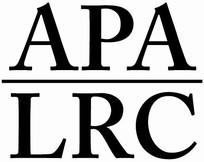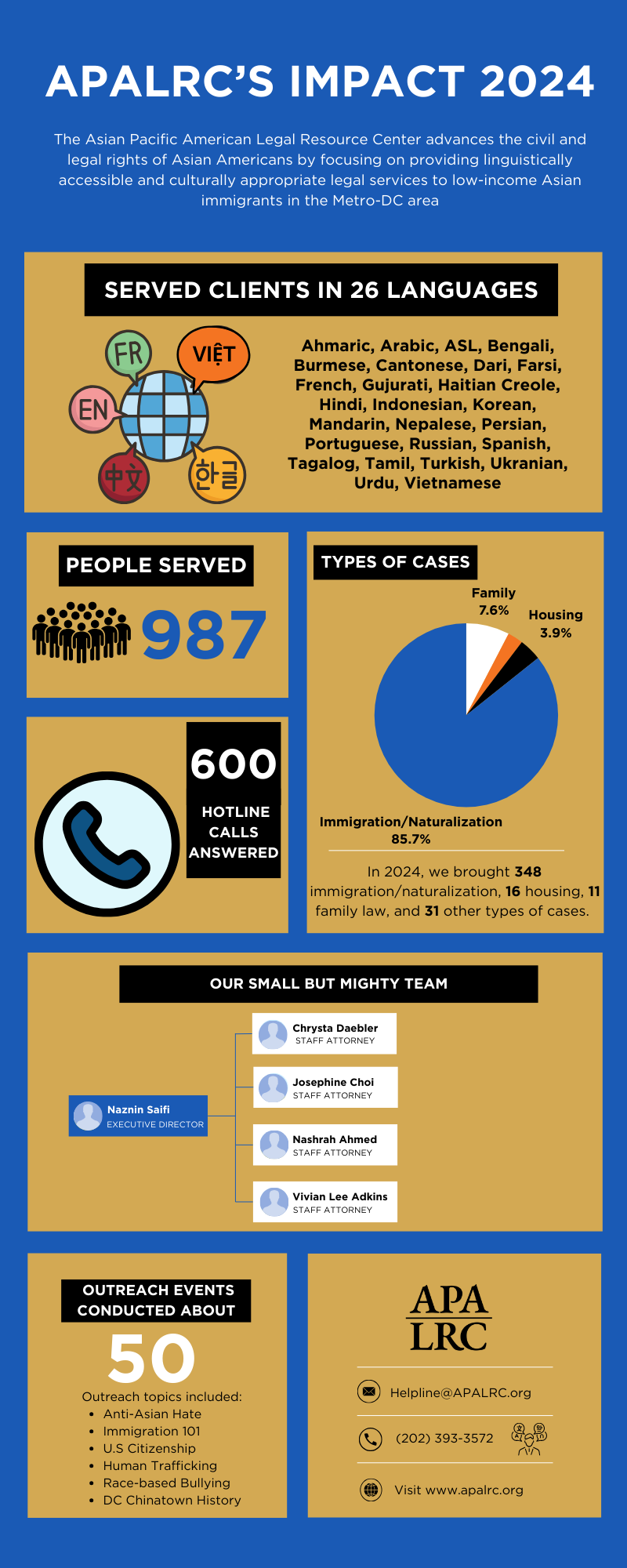
OUR MISSION
The mission of the APALRC is to advance the civil and legal rights of Asian Americans by focusing on providing linguistically accessible and culturally appropriate legal services to low-income Asian immigrants in the Metro-DC area, including those with limited English proficiency. Our goal is to ensure that Asian Americans can readily access government services and resources in the legal system to protect and enforce their rights, and to support their full participation in American society. The APALRC seeks to accomplish this mission through a three-pronged strategy that combines community legal education, individual representation, and systemic advocacy.
OUR HISTORY
Originally formed as an all-volunteer organization in 1998, the Asian Pacific American Legal Resource Center (APALRC) grew out of a collaborative effort by students from D.C. area law schools, attorneys associated with the Asian Pacific American Bar Association (APABA), and the South Asian Bar Association (SABA). The APALRC was founded in response to the lack of linguistically and culturally appropriate legal services for the growing number of Asian Pacific Americans in the D.C. metropolitan region. Since its founding, the APALRC has evolved from an all-volunteer organization to a full-fledged legal services organization, with 11 board members, 4 full-time staffers, and a number of bilingual legal interns and volunteers, along with more than 50 trained/qualified legal interpreters, who collectively speak more than 25 different Asian languages and dialects.
Since 1998, the APALRC has launched several projects to meet the emerging needs of the low-income Asian immigrant community in the Metropolitan D.C. area:
- Our first projects were the Multilingual Legal Helpline and the Legal Interpreter Project, that directly improved the community’s access to pertinent legal services.
- To respond to rising incidents of domestic violence in our community, we sponsored our first Equal Justice Works Fellow to implement the Legal Assistance for Victims of Domestic Violence Project, that focuses on assisting these individuals in obtaining immigration relief.
- We also implemented the Crime Victims Assistance Partnership (CVAP), to inform the community about victim compensation programs and support affected victims in the criminal justice process.
- We launched the Housing and Community Development Project to help preserve the dwindling stock of affordable housing in the District of Columbia’s Chinatown area, and to support Chinatown residents in their participation in land use and development review processes.
- To organize resources to help victims of human trafficking and foreign labor contracting fraud, we created the “Justice for Filipino Teachers” Project, and recruited law firms to provide pro bono assistance for this large group of clients.
- We continue to direct our resources to meet new needs in the community, such as the launch of the “Reaching the Dream” Project, which helps undocumented youths apply for temporary deportation reprieve, and the Legal Assistance for Domestic Workers Project, which addresses the intersecting employment and immigration issues many domestic workers face.
In addition to individual legal representation, we also engage in civil rights advocacy in collaboration with other social justice and civil rights advocacy groups. By working with other immigrant advocates, we ushered in the passage of the 2004 D.C. Language Access Act, that requires D.C. government agencies to provide language assistance to those with limited English proficiency. We also engage in voting rights issues by participating in poll monitoring and exit polling, to protect the voting rights of Asian Americans and to better understand the voting patterns of this population.

